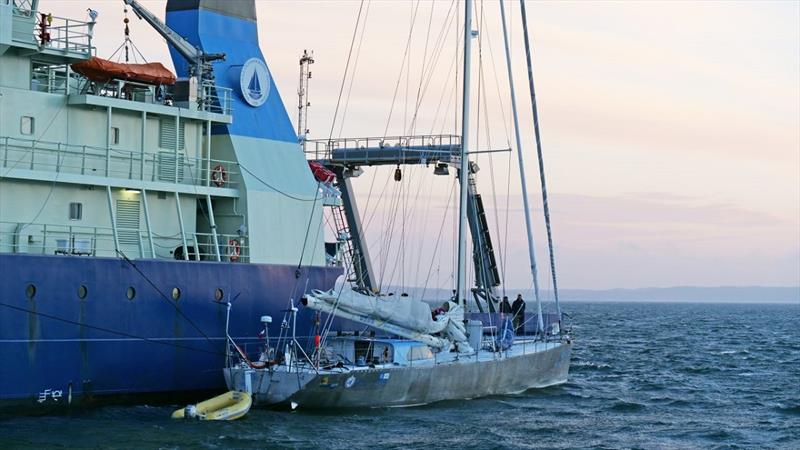
New ocean floats to boost global network essential for weather, climate research
by The Woods Hole Oceanographic Institution 19 Dec 2021 08:15 UTC

The 82-foot-long S/V Iris arrived at the Woods Hole Oceanographic Institution dock after a three week journey across the Atlantic, and moored next to WHOI's R/V Armstrong © Woods Hole Oceanographic Institution
Woods Hole Oceanographic Institution (WHOI) and partners have joined together to launch approximately 100 new Argo floats across the Atlantic Ocean to collect data that supports ocean, weather and climate research and prediction. These will bolster the international Argo Program, which maintains a global array of about 3,800 floats that measure pressure, temperature, and salinity of the upper 2,000 meters (1.2 miles) of the ocean.
The French sailing vessel Iris arrived in Woods Hole, Massachusetts last week after deploying the initial batch of 17 Argo floats across the Atlantic. The Iris crew picked up the remaining floats, restocked its supplies, and departed Woods Hole this week for the second leg of the voyage in the South Atlantic, towards the island of St. Helena, off the coast of Namibia. The mission is one of the largest Argo float deployments in the Atlantic and is expected to last almost 100 days at sea, filling in crucial observing gaps.
This low-carbon research mission using an 82-foot sailing vessel was made possible through a new partnership between the private oceanographic company Blue Observer and international Argo Program partners from WHOI, NOAA, Fisheries and Oceans Canada and Europe.
"Coming at a moment when we need meaningful action to tackle the climate crisis, this low carbon emission research mission sets a strong example for future ocean observing research," said Rick Spinrad, Ph.D., NOAA administrator. "This voyage is a model of global public-private partnership that is helping us improve data that drive life-saving weather and climate forecasts."
During what is one of the largest missions by a sailboat to deploy profiling floats, the S/V Iris crew will deliver Argo floats to predefined GPS positions, replacing those at the end of their service, and deploying floats in some new, under-measured regions to strengthen the Argo array. The mission lifetime of each float is about five years. During a typical mission, each float reports a profile of the upper ocean every ten days, transmitting data to shore by satellite.
"Argo has revolutionized our ability to detect and monitor how the global ocean is changing as climate changes," said Peter de Menocal, president and director of WHOI. "The whole ocean warming trends observed by Argo floats is proof positive that climate change is due to greenhouse gas emissions."
Pandemic sparks innovative mission
The initiative was born during the international Covid pandemic, when deployment of Argo floats and other oceanographic instruments by research and commercial vessels was sharply curtailed by Covid restrictions.
"About 1,000 Argo profiling floats must be deployed every year to sustain the Global Ocean Observing System," explained Mathieu Belbéoch, a manager of the Global Ocean Observing System and partner. "Often, they are deployed opportunistically by research ships, but these are very costly, and their trajectories are tied to specific missions and are not able to fill all the gaps or work in all seasons. Collaborations with citizens allow us to reach remote and not yet well sampled areas of the ocean, filling critical observational gaps."
The low-impact journey comes on the heels of the 2021 UN Climate Change Conference in Glasgow, Scotland, with its urgent message of curbing the planet's warming emissions. This innovative collaboration between intergovernmental, public, and private sectors also takes place within the United Nations Decade of Ocean Science for Sustainable Development, and is funded by NOAA, WHOI, Fisheries and Oceans Canada and Euro-Argo.
Argo has transformed ocean science
In more than two decades, the broad-scale global array of floats has grown to be a major component of the ocean observing system and has changed the way scientists think about collecting data and collaborating internationally on data management for the scientific and operational forecasting community.
"Argo's impact on ocean research has been profound: at least one paper a day is published using Argo data. The voyage of Iris will help us track vast regions of the Atlantic over the next few years by replenishing the array in very hard to access regions," said Susan Wijffels, senior scientist of physical oceanography at WHOI and an Argo Steering Team co-chair.
"The Argo program is a true demonstration of the value of international collaboration. Since 2001, Canada has launched over 600 Argo floats throughout the Atlantic and Pacific Oceans. This OCEANOPS Blue Observer Mission is another example of partners working together to provide ocean data to the world," stated Timothy Sargent, Deputy Minister, Fisheries and Oceans Canada.